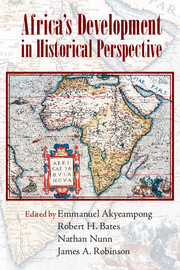Introduction
Africa – The Historical Roots of Its Underdevelopment
Published online by Cambridge University Press: 05 September 2014
Summary
Africa poses the development challenge of our time. Once devastated by famine and mired in poverty, India and much of Asia are now growing economically. While Africa’s economies too are now growing, in many African countries, people are just now returning to the levels of per capita income they enjoyed more than a half century ago. The current poverty and the widespread economic decline following independence in Africa have led to a great deal of research by development economists and political scientists (Bates 1981; Easterly and Levine 1997; Ndulu et al. 2007; Sachs and Warner 1997). Yet this work is often very policy focused and does not place Africa within the larger processes that created the Great Divergence in the early modern and modern worlds (Pomeranz 2000).
This is somewhat odd, because the adoption of a much more historical approach has revolutionized research on comparative economic development in the past fifteen years. For example, the economic divergence that took place in the Americas during the nineteenth and twentieth centuries is now seen as deeply rooted in the different institutional structures created during the colonial period (Bruhn and Gallego 2012; Dell 2010; Engerman and Sokoloff 1997, 2011). It is commonplace, though not uncontroversial, to blame Africa’s economic problems on its economic, political, and perhaps social institutions. It is less common to find studies that situate these issues in a historical context and consider why they diverged from the rest of the world in the first place (see Austin 2008; Nunn 2008a; and Acemoglu, Johnson, and Robinson 2001, 2002; Acemoglu and Robinson, 2010, for exceptions).
- Type
- Chapter
- Information
- Africa's Development in Historical Perspective , pp. 1 - 30Publisher: Cambridge University PressPrint publication year: 2014
References
- 4
- Cited by



